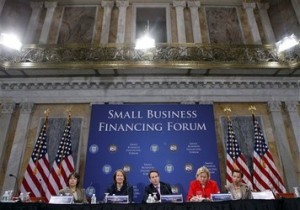U.S. Treasury Secretary Timothy Geithner, Federal Deposit Insurance Corp. Chair Sheila Bair and U.S. Small Business Administration head Karen Mills co-chaired the Small Business Financing Forum in which the usual sound bites were offered about the importance of small business to the U.S. economy: the “engines of job growth”, support the tax base, lead the country out of recession, etc. etc. Geithner stated that small businesses are more vulnerable to banking crises, as 90% of them obtain their credit from banks as compared with 30% of large corporations. As small businesses have fewer capital resources to work through a credit drought, they paid dearly for the errors of the banking sector and the government. Geithner outlined the Obama Administration’s six-step plan for help small businesses access credit:
- Provide direct support through the Recovery Act to promote government loans guaranteed through the SBA. I have already blogged about why this approach won’t work.
- Support small business lenders by providing low-cost capital to community development financing institutions.
- Repair securitization markets by promoting the Term Asset-Backed Securities Loan Facility program to lower the interest costs on asset-backed loans.
- Provide guidance to lenders. This appears a polite euphemism for the process by which regulators browbeat the banks they supervise. It hasn’t worked yet.
- Support government programs by lending agencies like the U.S. Export-Import Bank. Unfortunately, such programs are welfare for large corporations that can secure credit and insurance through the private sector.
- Exert pressure on banks to use federal assistance programs. The Administration apparently believes that the top 19 banks that received TARP (Troubled Asset Relief Program) aid should participate in SBA lending programs. Unfortunately, SBA lending programs don’t meet the credit needs of most small businesses. The increased guarantees on the loans simply mean that the taxpayers will bear more losses for inexperienced banks to move up the small business credit learning curve. This is a terrible idea.
To watch the video of the U.S. Treasury Secretary’s presentation, click here.

